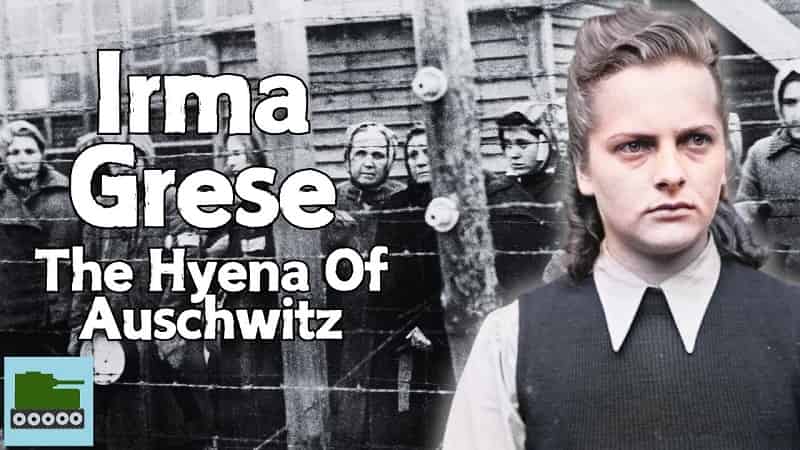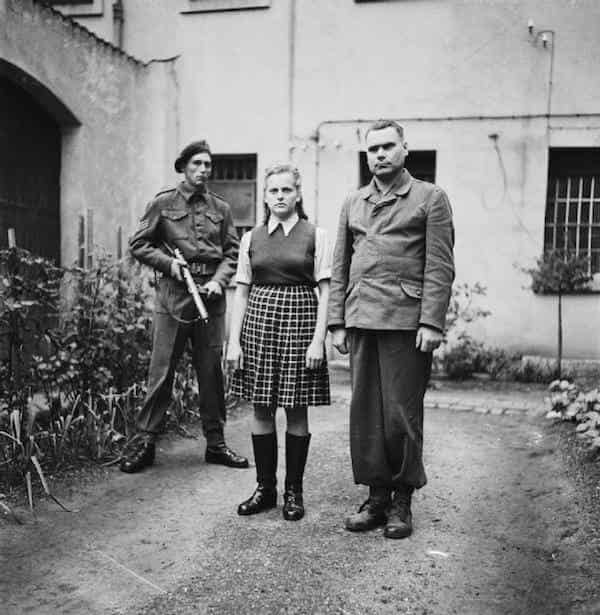Irma Grese: The Hyena of Auschwitz – The Story of One of History’s Most Notorious Female War Criminals

Irma Grese, infamously known as “The Hyena of Auschwitz,” was one of the most notorious female war criminals in history. Her involvement in the Holocaust, particularly in the concentration camps of Auschwitz and Bergen-Belsen, has made her name synonymous with cruelty, sadism, and inhumanity. Her actions during World War II continue to haunt the memory of survivors and stand as a chilling reminder of the horrors committed by the Nazi regime.
Early Life of Irma Grese
Irma Grese was born on October 7, 1923, in Wrechen, Germany. Raised in a rural farming family, her early life was marked by instability. Her mother, Berta, committed suicide in 1936, which is believed to have had a profound impact on young Irma. At the age of 15, she left school and became deeply involved in the Nazi Party, eventually joining the League of German Girls, an extension of the Hitler Youth movement. This indoctrination played a significant role in shaping her brutal future.
Rise to Power: From Nurse to SS Guard
Initially, Grese pursued nursing, but her ambitions led her to apply for a position as a guard in the SS female auxiliary corps. By 1942, at the age of 19, she was assigned to the infamous Auschwitz-Birkenau concentration camp, where she quickly rose through the ranks. Grese’s transition from an ordinary citizen to a brutal overseer was rapid. Her rise to power reflected both the Nazi ideology of female subservience to the regime and her personal thirst for control and dominance.
The Cruelty of “The Hyena of Auschwitz”
Irma Grese’s actions in Auschwitz earned her the nickname “The Hyena of Auschwitz,” due to her unmatched cruelty towards prisoners. Survivors of the Holocaust recount her sadistic behavior, describing her as a woman who took pleasure in inflicting pain. She was known for carrying a whip, which she used indiscriminately on prisoners, and for her brutal treatment of women and children.
Grese was also involved in selecting prisoners for the gas chambers, demonstrating her complicity in mass murder. Her beauty and youthful appearance stood in stark contrast to the horrors she inflicted, making her one of the most feared figures in the camps.
Bergen-Belsen and the End of the War
In 1944, Grese was transferred to the Bergen-Belsen concentration camp, where her brutality continued until the camp’s liberation by British forces in April 1945. By the time Bergen-Belsen was liberated, thousands had died of starvation, disease, and mistreatment, and Grese was among the SS personnel arrested by Allied forces.

The Belsen Trial: Facing Justice
Following the war, Irma Grese was brought to trial at the Belsen Trial, one of the first major war crime tribunals. She faced numerous charges of crimes against humanity, including her involvement in the atrocities committed at Auschwitz and Bergen-Belsen. Witnesses testified about her sadistic behavior, recounting horrific stories of torture, beatings, and selections for execution.
Throughout the trial, Grese remained unrepentant, denying the extent of her cruelty. However, the overwhelming evidence against her sealed her fate. On December 13, 1945, at the age of 22, she was executed by hanging, making her one of the youngest women to be sentenced to death for war crimes during World War II.
Legacy of Irma Grese
Irma Grese’s legacy is one of horror and infamy. Her actions during the Holocaust serve as a stark reminder of the depths of human cruelty and the dangers of unchecked power. While many Nazi war criminals have been remembered for their roles in planning or executing large-scale atrocities, Grese’s personal involvement in the torture and suffering of individuals stands out as particularly heinous.
Her story also raises questions about how ordinary individuals can be transformed into perpetrators of unimaginable violence. Grese was not a high-ranking official, nor was she a key player in the Nazi regime’s leadership. Yet, her individual actions and choices led to the suffering and death of countless innocent people.
Irma Grese’s story is a chilling chapter in the history of World War II and the Holocaust. As “The Hyena of Auschwitz,” she exemplified the worst of Nazi sadism and cruelty, earning her place among the most infamous war criminals in history. Her life, trial, and execution serve as a stark reminder of the horrors of the Holocaust and the importance of justice in the face of unimaginable evil.
Frequently Asked Questions (FAQ) About Irma Grese, The Hyena of Auschwitz
1. Who was Irma Grese?
Irma Grese was a Nazi concentration camp guard during World War II. She served at Auschwitz-Birkenau and Bergen-Belsen, where she was notorious for her cruelty towards prisoners. She earned the nickname “The Hyena of Auschwitz” due to her sadistic behavior.
2. Why was Irma Grese called “The Hyena of Auschwitz”?
Grese was given this nickname because of her vicious treatment of prisoners at Auschwitz. She was known for her sadistic cruelty, including beating, torturing, and participating in the selection of prisoners for the gas chambers.
3. What crimes did Irma Grese commit?
Irma Grese was charged with crimes against humanity for her actions in concentration camps. She was responsible for torturing and abusing prisoners, participating in selections for executions, and showing extreme brutality, particularly towards women and children.
4. What role did Irma Grese play in the Holocaust?
As an SS guard, Grese played a direct role in the daily atrocities at Auschwitz and later Bergen-Belsen. She was actively involved in selecting prisoners for execution and was known for her violent and sadistic behavior, contributing to the suffering and death of countless inmates.
5. Was Irma Grese ever brought to justice?
Yes, after World War II, Irma Grese was captured by Allied forces and put on trial during the Belsen Trials in 1945. She was convicted of war crimes and crimes against humanity. Grese was sentenced to death and was executed by hanging on December 13, 1945, at the age of 22.
6. How did Irma Grese become a concentration camp guard?
Grese initially sought a career in nursing but eventually joined the Nazi SS auxiliary corps. In 1942, she was assigned to Auschwitz-Birkenau as a guard, where she quickly rose in rank due to her loyalty to the regime and her willingness to inflict suffering on prisoners.
7. What was Irma Grese’s background?
Irma Grese was born on October 7, 1923, in a small farming community in Germany. After a troubled childhood, she became involved in Nazi organizations like the League of German Girls and later pursued a position as an SS guard in concentration camps.
8. How old was Irma Grese when she was executed?
Irma Grese was 22 years old when she was executed by hanging on December 13, 1945. Despite her young age, she became one of the most infamous war criminals of the Holocaust due to her brutal actions.
9. Did Irma Grese show any remorse during her trial?
No, Irma Grese showed no remorse during her trial at the Belsen Trials. She denied much of the testimony against her and did not express regret for her actions, even as overwhelming evidence of her cruelty was presented.
10. What is Irma Grese’s legacy?
Irma Grese’s legacy is one of infamy and horror. Her name is remembered as a symbol of female complicity in Nazi atrocities and the extreme cruelty exhibited by concentration camp guards. Her actions serve as a chilling reminder of the capacity for ordinary people to commit extraordinary evil under oppressive regimes.
11. What was Irma Grese’s role in the selection process at Auschwitz?
Grese was involved in the selection process at Auschwitz, where she chose prisoners to be sent to the gas chambers. This role made her complicit in the mass murders committed at the camp, contributing to the deaths of thousands of innocent people.
12. Are there any films or books about Irma Grese?
Irma Grese has been the subject of various books and documentaries on the Holocaust and Nazi war criminals. She is often featured in works that explore the role of women in the Nazi regime and the psychology of those who committed war crimes.
